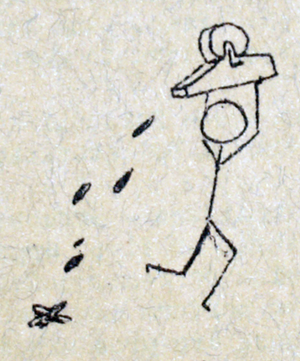Difference between revisions of "Cartoons"
| Line 5: | Line 5: | ||
}} | }} | ||
| − | {{fancy1|text= | + | {{fancy1|text= [[File:Cartoons - Example.png|thumb]] |
A cartoon is usually a single drawing in which, if a story is implied, the conversation or actions of the characters must convey it. Cartoons are simplified drawings; if the picture is of a type that is not obviously distinguishable from fotography, it is not a cartoon. Bei uns this artype is usually fan-fictional: a [[fan]] takes a look at his new son and says 'Oh my God! [[Tendrils]]!', [[ktp]]. Often seen are pages of toothpick figures doing varied things in the manner of American Legion cartoonist Wallgren. Caricature is a near cousin of the cartoon. | A cartoon is usually a single drawing in which, if a story is implied, the conversation or actions of the characters must convey it. Cartoons are simplified drawings; if the picture is of a type that is not obviously distinguishable from fotography, it is not a cartoon. Bei uns this artype is usually fan-fictional: a [[fan]] takes a look at his new son and says 'Oh my God! [[Tendrils]]!', [[ktp]]. Often seen are pages of toothpick figures doing varied things in the manner of American Legion cartoonist Wallgren. Caricature is a near cousin of the cartoon. | ||
| − | + | ||
}} | }} | ||
Revision as of 01:01, 23 August 2020
| From Fancyclopedia 2, ca. 1959 |
| A cartoon is usually a single drawing in which, if a story is implied, the conversation or actions of the characters must convey it. Cartoons are simplified drawings (if the picture is realistic or artistic it is not a "cartoon"). Caricature is a near cousin. Bei uns this art-form is usually fan-fictional; a fan takes a look at his young son and exclaims "Omigawd! Tendrils!" ktp.
Several varieties of cartoon-character must be distinguished. Aside from obviously non-human creatures like Jean Young's Roubidoux Bird and Archie Mercer's Trufins, humanoid cartoon-characters may be classified as actually manlike, stick figures, or phallic symbol men. William Rotsler gave widest circulation to the latter, whose name will readily be understood from a glance at the illustration. ("You might add", mentions WR, "that 99% of the captions you see on them are not mine. People will use my drawings and then add captions of their own. I wouldn't have minded if they were any good at it...") Obviously related are Ray Nelson's Globlies, J&dYoung's Poo and Yobber, the Laney Character, and Charles Wells' Foofs. Jack Speer has contributed whole pages of stick figures doing varied things in the manner of American Legion cartoonist Wallgren; to this category also belong Lee Hoffman's Li'l Peepul, Jean Young's Jeff City Men, some of Jean Linard's drawings, and Dean Grennell's Blork-men... tho here we begin to shade into the actually manlike creatures like Shelby Vick's Puffins, the Dave English character, and Harlan Ellison's Max J Runnerbean. Hard to classify are a few whimsical anomalies like Terry Carr's face critturs and the faces Walt Liebscher used to do with the typer-keyboard. |
| From Fancyclopedia 1, ca. 1944 |
|
A cartoon is usually a single drawing in which, if a story is implied, the conversation or actions of the characters must convey it. Cartoons are simplified drawings; if the picture is of a type that is not obviously distinguishable from fotography, it is not a cartoon. Bei uns this artype is usually fan-fictional: a fan takes a look at his new son and says 'Oh my God! Tendrils!', ktp. Often seen are pages of toothpick figures doing varied things in the manner of American Legion cartoonist Wallgren. Caricature is a near cousin of the cartoon. |
| Publishing |
